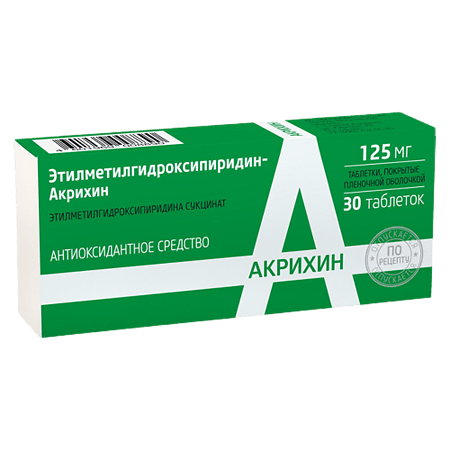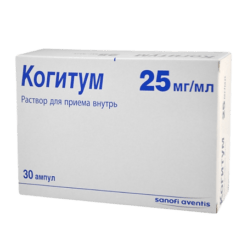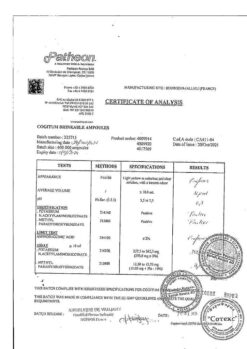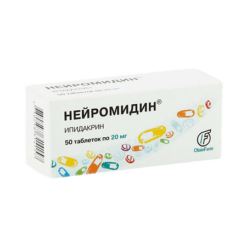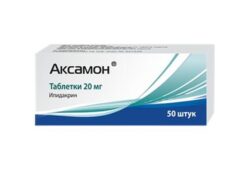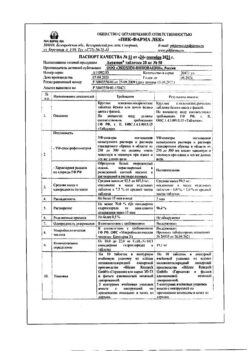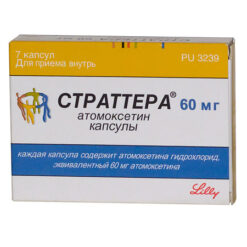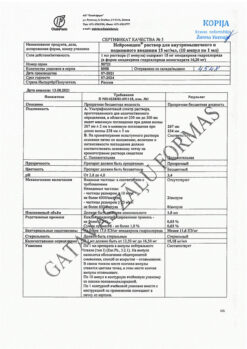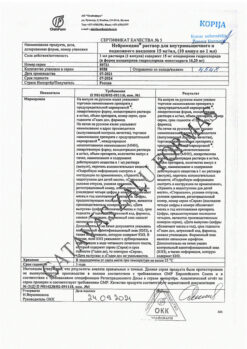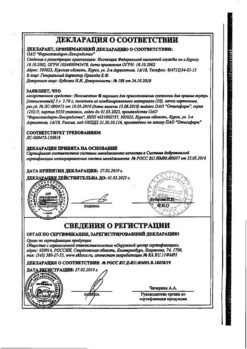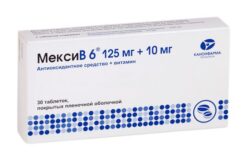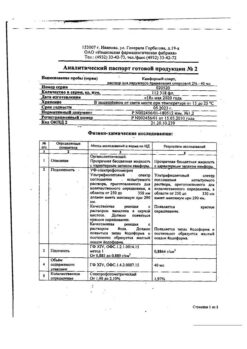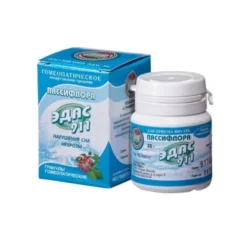No products in the cart.
Ethylmethylhydroxypyridine-Acrichin, 125 mg 30 pcs
€1.00
Out of stock
(E-mail when Stock is available)
Description Pharmacotherapeutic group: Antioxidant Pharmacodynamics: Pharmacokinetics:
ATC: N.07.X.X Other drugs for the treatment of diseases of the nervous system
Ethylmethylhydroxypyridine is an inhibitor of free-radical processes, a membranoprotector with antihypoxic, stress-protective, nootropic, antiepileptic and anxiolytic effects. It belongs to the class of 3-oxypyridines.
The mechanism of action of ethylmethylhydroxypyridine is due to its antioxidant, antihypoxant and membrane-protective action. It inhibits lipid peroxidation, increases superoxide dismutase activity, increases lipid-protein ratio, improves cell membrane structure and function. The drug modulates the activity of membrane-bound enzymes (calcium-independent phosphodiesterase, adenylate cyclase, acetylcholinesterase), receptor complexes (benzodiazepine, GABA, acetylcholine), which increases their ability to bind to ligands, helps maintain the structural and functional organization of biomembranes, transport neurotransmitters and improve synaptic transmission.
Ethylmethylhydroxypyridine-Acrichine increases the content of dopamine in the brain. Causes enhancement of compensatory activation of aerobic glycolysis and reduction of the degree of inhibition of oxidative processes in the Krebs cycle under hypoxia with increase of adenosine triphosphate (ATP) and creatine phosphate, activation of energy-synthesizing functions of mitochondria.
Enhances resistance of the body to various damaging factors in pathological conditions (hypoxia and ischemia, disorders of cerebral circulation, intoxication with ethanol and antipsychotic drugs).
In conditions of critical reduction of coronary blood flow promotes the preservation of structural and functional organization of cardiomyocyte membranes, stimulates the activity of membrane enzymes – phosphodiesterase, adenylate cyclase, acetylcholinesterase. It supports activation of aerobic glycolysis developing in acute ischemia and promotes under hypoxia restoration of mitochondrial redox processes, increases ATP and creatine phosphate synthesis. Ensures the integrity of morphological structures and physiological functions of ischemic myocardium. Improves the clinical course of myocardial infarction, increases the effectiveness of therapy, accelerates the recovery of LV myocardial functional activity, reduces the frequency of arrhythmias and intracardiac conduction disturbances. It normalizes metabolic processes in ischemic myocardium, increases antianginal activity of nitrates, improves rheological properties of blood, reduces consequences of reperfusion syndrome in acute coronary failure.
Limits enzymatic toxemia and endogenous intoxication in acute pancreatitis.
It improves metabolism and blood supply of the brain, improves microcirculation and rheological properties of the blood, reduces platelet aggregation. It stabilizes membrane structures of blood cells (erythrocytes and platelets), reducing the likelihood of hemolysis. It has hypolipidemic effect, reduces the content of total cholesterol and low-density lipoproteins.
The anti-stressor effect is shown in normalization of post-stress behavior, somatovegetative disorders, restoration of sleep-wake cycles, disturbed learning and memory processes, decrease of dystrophic and morphological changes in different structures of the brain.
Ethylmethylhydroxypyridine-Acrichine has a pronounced anti-toxic effect during withdrawal syndrome. It eliminates neurological and neurotoxic manifestations of acute alcohol intoxication, restores behavioral disorders, vegetative functions and is also able to relieve cognitive disorders caused by prolonged ethanol intake and its withdrawal.
The effects of tranquilizers, neuroleptics, antidepressants, hypnotics and anticonvulsants are increased under the influence of the drug, which allows reducing their doses and side effects.
Ethylmethylhydroxypyridine-Acrichine improves the functional state of the ischemic myocardium. In conditions of coronary insufficiency it increases collateral blood supply of ischemic myocardium, promotes preservation of integrity of cardiomyocytes and maintenance of their functional activity. Effectively restores myocardial contractility in reversible cardiac dysfunction.
Absorption and distribution
It is rapidly absorbed when ingested (half-absorption period is 0.08-1 h). Time to reach maximum concentration (TSmax) when taken orally is 0.46-0.5 h. Maximum concentration (Cmax) when administered orally is 50-100 ng/ml.
It is rapidly distributed in the organs and tissues. Average retention time of ethylmethylhydroxypyridine succinate in the body when administered orally is 4.9-5.2 hours.
Metabolism
Metabolized in the liver by glucuronidation. Five metabolites were identified: 3-oxypyridine phosphate – is formed in liver, with the help of alkaline phosphatase it splits into phosphoric acid and 3-oxypyridine; the 2nd metabolite – pharmacologically active, is formed in large amounts and is found in urine 1-2 days after administration; the 3rd one is excreted in large amounts with urine; the 4th and the 5th are glucuronconjugates.
The elimination half-life when administered orally (T1/2) is 4.7-5 hours. It is rapidly excreted in the urine, mainly as metabolites (50% in 12 hours) and in a small amount – in unchanged form (0.3% in 12 hours). It is most intensively excreted during the first 4 hours after drug administration. The rates of urinary excretion of unchanged drug and metabolites have individual variability.
.
Indications
Indications
– Consequences of acute cerebral circulation disorders, including. after transient ischemic attacks, in the phase of subcompensation as preventive courses;
– mild craniocerebral trauma, consequences of craniocerebral injuries;
– encephalopathies of various genesis (discirculatory, dysmetabolic, post-traumatic, mixed);
– autonomic dystonia syndrome;
– mild cognitive disorders of atherosclerotic genesis;
– anxiety disorders in neurotic and neurosis-like conditions;
– ischemic heart disease as part of complex therapy;
– management of withdrawal syndrome in alcoholism with prevalence of neurotic and vegetative-vascular disorders, postabstinence disorders;
– conditions after acute intoxication with antipsychotic drugs;
– asthenic conditions, as well as for the prevention of the development of somatic diseases under the influence of extreme factors and loads;
– effects of extreme (stress) factors.
Active ingredient
Active ingredient
Composition
Composition
1 tablet contains:
the active substance:
Ethylmethylhydroxypyridine succinate – 125 mg;
excipients: lactose monohydrate, copovidone, calcium stearate;
film coating composition: Opadray II ready-mix white (hypromellose, titanium dioxide, lactose monohydrate, macrogol 4000, triacetin).
How to take, the dosage
How to take, the dosage
Ingestion 125-250 mg 3 times daily; maximum daily dose is 800 mg (6 tablets).
The duration of treatment is 2-6 weeks; for stopping alcohol withdrawal – 5-7 days.
The treatment is stopped gradually, reducing the dose over 2-3 days.
The initial dose is 125-250 mg (1-2 tablets) 1-2 times a day with gradual increase until therapeutic effect; the maximum daily dose is 800 mg (6 tablets).
The duration of therapy in patients with coronary heart disease is at least 1.5-2 months. It is recommended to make repeated courses (according to the doctor’s recommendation) during the spring and autumn periods.
Interaction
Interaction
Ethylmethylhydroxypyridine-Acrichine can be combined with all drugs used for the treatment of somatic diseases.
Special Instructions
Special Instructions
Pediatric use
The drug is not indicated in children under 18 years of age due to insufficient study of the drug action.
When taking the drug, caution should be exercised in activities requiring rapid psychophysical reactions (driving vehicles, operating machinery, etc.).
Synopsis
Synopsis
Contraindications
Contraindications
Acute liver and kidney function abnormalities, hypersensitivity to the drug.
In connection with insufficient study of the drug action – childhood, pregnancy, breast-feeding.
Side effects
Side effects
Digestive system disorders: individual adverse reactions of dyspeptic or dyspeptic nature may occur.
Others: allergic reactions possible.
Overdose
Overdose
Symptoms: drowsiness, insomnia.
Treatment: due to low toxicity, overdose is unlikely. Treatment is usually not required – symptoms disappear on their own within 24 hours. If symptoms are severe, supportive and symptomatic treatment is administered.
Pregnancy use
Pregnancy use
Similarities
Similarities
Additional information
| Shelf life | 2 years. Do not use after the expiration date. |
|---|---|
| Conditions of storage | In a dry place at a temperature not exceeding 25 ° C. Store out of the reach of children. |
| Manufacturer | Akrihin HFC JSC, Russia |
| Medication form | pills |
| Brand | Akrihin HFC JSC |
Related products
Buy Ethylmethylhydroxypyridine-Acrichin, 125 mg 30 pcs with delivery to USA, UK, Europe and over 120 other countries.

